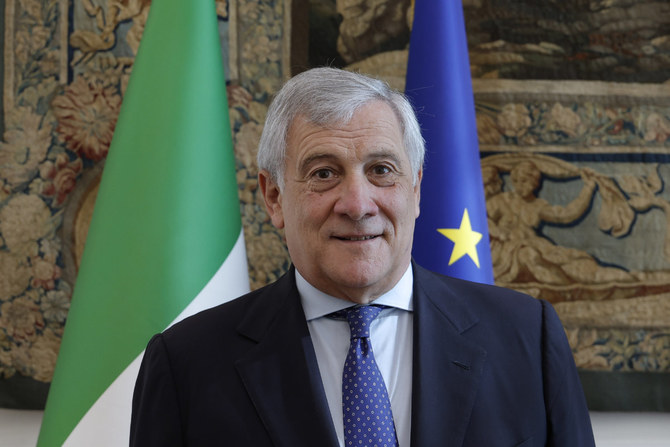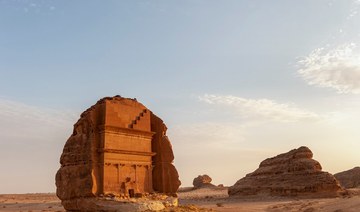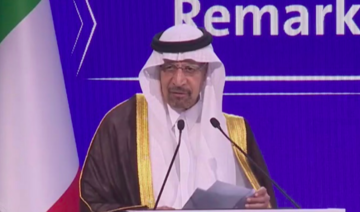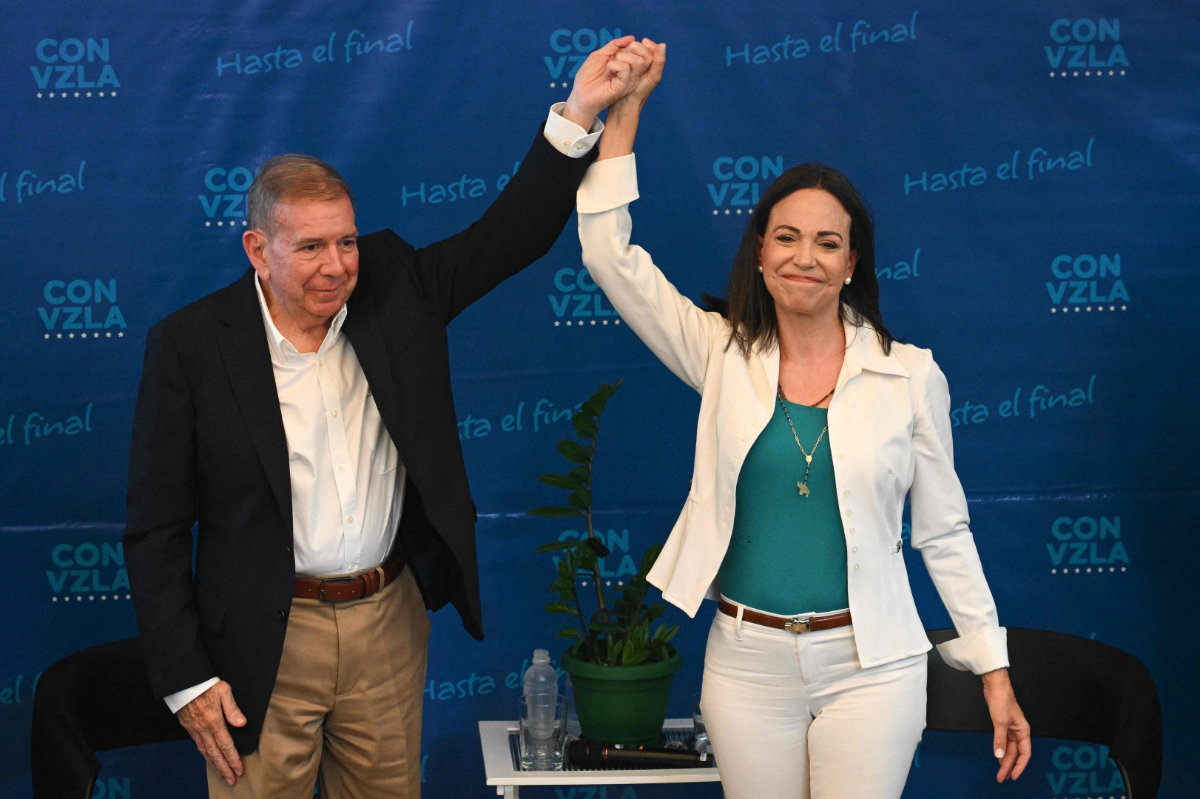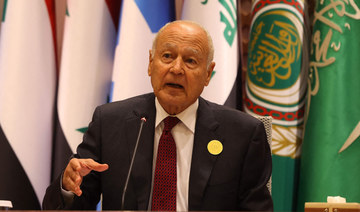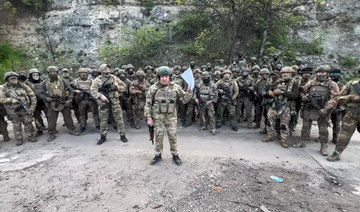ROME: Italy is “deeply committed” to strengthening its relations with Saudi Arabia and other Gulf countries, according to Antonio Tajani, the country’s deputy prime minister and minister of foreign affairs and international cooperation.
In an interview with Arab News on the eve of his visit to Saudi Arabia, Tajani offered an expansive and promising perspective of both current and future relations between Italy and the Kingdom.
“The significance of this (Gulf) region on the global stage, in geostrategic and economic terms, can hardly be overstated,” he said.
“Saudi Arabia is a key player, and my visit to Riyadh is meant to reaffirm the strong ties that bind our two countries.”

A delegation of Saudi entrepreneurs and investors, led by Kamel Al-Munajjed, thepresident of the Saudi-Italian Business Council, met in Rome on Thursday with the Italian Minister for Economic Development Adolfo Urso in May 2023. (Supplied)
He was referring to a relationship that has blossomed in recent years not only in the economic and commercial sectors but also at the geopolitical and cultural levels.
Ties between the two countries were first established in February 1932, which were cemented after the establishment of the Kingdom of Saudi Arabia by a trade treaty signed on Sept. 22 the same year.
“Our objective is to strengthen our relationship even further,” Tajani said. “Italy’s approach is based on dialogue and consensus building across the board, with no hidden agenda. We can therefore play a role in fostering strategic partnership based on mutual understanding and capable of producing positive outcomes to the benefit of the countries involved, in the interest of international stability.”
According to data from the Observatory of Economic Complexity, Italy exported over $4 billion in goods to Saudi Arabia, mainly machine parts and medicaments, in 2021. The same year, Saudi exports to Italy — primarily crude and refined petroleum — reached $5.86 billion. In 2022, the volume of trade between Italy and Saudi Arabia reached 11.5 billion euros ($12.04 billion).

A delegation of Saudi entrepreneurs and investors, led by Kamel Al-Munajjed, thepresident of the Saudi-Italian Business Council, met in Rome on Thursday with the Italian Minister for Economic Development Adolfo Urso in May 2023. (Supplied)
Italy and Saudi Arabia are also seeking to diversify their trade ties, particularly as both the Kingdom and the EU are moving away from fossil fuels as part of a transition to “green energy” and economic diversification.
Tajani described the Arab Gulf region as a potential renewable energy powerhouse of strategic importance for both Italy and Europe, maintaining over time its relevance as a key supplier in this domain.
In this regard, he pointed out that the EU plans to import clean electricity and hydrogen under the REPowerEU plan, which aims to end the bloc’s reliance on Russia’s gas supplies by 2030.
“We commend the great efforts undertaken (by the Gulf countries), particularly by Saudi Arabia, in the green transition by investing in solar and wind power and in refocusing fossil fuels for hydrogen production,” Tajani said.
“I am sure that this strategy will guarantee you amazing returns in the long run.”

The capacity of the world’s largest single-contracted PV solar plant, to be located in Sudair Industrial City in Saudi Arabia’s north, will be 1,500MW. (Supplied)
Elaborating on the issue, he said: “For example, the green hydrogen produced at NEOM (smart city in Saudi Arabia) can indeed feed the European market by transiting through the Italian network.
“In addition, Italy is already acting as a supplier of knowledge and technology for the Kingdom’s journey towards net zero, as many Italian companies are engaged in a number of energy projects with Saudi energy stakeholders, starting from Saudi Aramco and ACWA Power.”
On Sept. 4, ACWA Power signed deals with six Italian companies, including energy firm Eni, additives manufacturer Italmatch Chemicals, industrial solutions provider Industrie De Nora and waste management firm A2A. The agreements, finalized at the Saudi-Italian Investment Forum in Milan, cemented collaboration in the fields of green hydrogen, water desalination, and research into sustainable technologies.
The forum saw 21 cooperation agreements concluded in various sectors, from clean energy and healthcare to real estate and waste management. More than 1,000 companies attended the forum, which was a follow-up to the previous forum held in Riyadh last year.
“(Italy) is only in the top 20 as an investor in the Kingdom, and the value of our bilateral non-oil trade amounts to a mere $1.4 billion — which means we are far from reaching the full potential of our partnership,” Saudi Arabia’s Minister of Investment Khalid Al-Falih stated at this year’s forum.

Saudi Investment Minister Khalid Al-Falih addressing the Saudi-Italian Investment Forum in Milan, Italy, on Sept. 4, 2023. (Supplied)
Tajani said the Saudi-Italian Investment Forum was successful partly because “many Italian companies got to know the tangible opportunities available under Saudi Vision 2030, both in terms of upcoming tenders in the framework of megaprojects and giga-projects, and in terms of incentives for direct industrial investments.”
With more than 150 Italian companies currently holding foreign investment licenses in Saudi Arabia, there could be far greater economic cooperation on the horizon for the two countries.
Tajani said Italy can contribute to the megaprojects and giga-projects “because of its universally recognized know-how and expertise in sectors on which the Saudi authorities are focusing such as new mobility, new urban and architectural design, new residential areas and new touristic resorts.”

Saudi Culture Minister Prince Bader bin Abdullah bin Farhan, right, and his Italian counterpart Gennaro Sangiuliano at a ceremony in Venice in May 19, 2023, during which they signed a memorandum of understanding to foster cooperation in the sectors of archaeology, conservation, restoration and protection of cultural heritage, film and literature. (X: @mocsaudi_en)
For good measure, he said: “We could collaborate with the Kingdom in getting the most from the nexus between tourism and historical heritage. We are already cooperating for the development of the AlUla and Diriyah UNESCO sites as well as Dumat Al-Jandal, where Italy has an important archeological mission for the last two decades.”
The Italian conservation institute Centro Conservazione e Restauro “La Venaria Reale” partnered with the Royal Commission for AlUla this year, which will see 12 Saudi professionals participating in workshops in northern Italy’s Turin and the Kingdom’s cultural heritage site at AlUla.
Last year, Italy was among the top five countries of origin for tourists to Saudi Arabia. The first half of 2022 witnessed around 1,500 Italians travel to the Kingdom.
Rome hosted the Saudi Village in late September this year, giving Italians a chance, in their own capital, to experience the Kingdom’s culture, heritage, cuisine and tourist attractions. Organized by the Saudi Embassy in Italy, the event was held in Villa Borghese, the historical park in the heart of Italy’s capital, with attractions for adults and children.
Several Italian and Saudi Arabia companies were represented at the event, as well as representatives from the Kingdom’s ministries of investment, sports, and education, Saudi Tourism Authority and Royal Commission for AlUla.

Italians got a glimpse of Saudi culture, heritage, cuisine and tourist attractions during the Saudi Village event in Rome late last month. Organized by the Saudi Embassy in Italy, the event was held at Casina Valadier in Villa Borghese, the historical park in the heart of Italy’s capital. (X: @KSAembassyIT)
Italy is seeking Gulf and Saudi Arabia investments in the “Made in Italy” strategic fund, meant to boost critical supply chains. Referring to the fund, Tajani said it would be “a safe and profitable investment for Gulf sovereign funds, such as the Saudi Public Investment Fund (PIF), considering also that it is in line with their long-term strategies.”
He added: “The fund will be soon in place, after the approval of the parliament, which is underway, and will become a key instrument of Italian industrial policy. Through direct or indirect private equity investments, the fund will boost key Italian companies with considerable growth and of strategic importance for the overall economy.”
Tajani also said that Italy has launched a series of travelling exhibitions to showcase its manufacturing and creative industries abroad, highlighting their links with the local territory and know-how.
“‘Made in Italy’ is not only the so-called three Fs, namely fashion, food, furniture. In fact, Italy is the second-largest manufacturing country in Europe, a leader in high-value-added sectors, such as mechanics, electronics and pharmaceutical,” Tajani said.
“It is the combination of tradition and innovation that makes Italy capable of producing products that are increasingly appreciated in international markets. Against this backdrop, we would like to expand our economic and commercial partnership with countries like Saudi Arabia, which appreciate the value of Italian know-how, craftsmanship and beauty.”
He cited Ferrari and Maserati as examples of two “very well known ‘Made in Italy’ brands chosen all over the world not for their quality, design and functionality but also for the rich and diversified cultural heritage they embody.”
While Italy is searching for strategic investment from Saudi Arabia, it is also looking beyond the Gulf for partners in economic cooperation, although there are challenges and rewards to being part of international economic blocs.
Italy has recently questioned its continuing role in China’s Belt and Road Initiative, while agreeing to join the planned India-Middle East-Europe Economic Corridor, or IMEC, in mid-September.
Opinion
This section contains relevant reference points, placed in (Opinion field)
“During my recent trip to Beijing, I confirmed Italy’s interest to develop even further our cooperation on many fronts. At the same time, I told my Chinese counterparts that Italy did not benefit from being part of the Belt and Road Initiative,” he said.
Tajani’s view is that there are other bilateral frameworks that could help develop and strengthen Italy’s relationship with China.
Looking to the future, he said: “Our government is willing to create stronger ties with key partners in the Middle East, such as Saudi Arabia, and India. Our decision to be part of the IMEC goes exactly in this direction.”
Italy is also seeking partners in the struggle against irregular migration, according to Tajani. “In July, we convened in Rome the International Conference on Development and Migration with key partners from Africa, the Mediterranean, and the Gulf,” he said.
READ MORE: How Saudi-backed India-Middle East corridor is ‘game changer’ for New Delhi
“On that occasion, we launched the Rome Process to establish an inclusive and comprehensive dialogue to put in place wide-ranging cooperation to address the root causes of mass migration, fight against human trafficking and illegal immigration, govern legal migration flows, and support refugees and displaced persons.”
Tajani praised the participation of Prince Abdulaziz bin Saud bin Naif, Saudi Arabia’s interior minister, for his participation in the summit. “We are grateful for your country’s valuable contribution to its success. Italy and Saudi Arabia share the same view on fighting against human trafficking and criminal networks active in this field,” Tajani said.
Nearly one year has elapsed since the formation of a new government, which has been marked by the rekindling of international diplomatic relations and the rebuilding of bonds with the Arab world. Tajani called the progress made under the current government “remarkable.”
“Our main objective was to strengthen our partnership with Washington, make our voice more relevant in the EU arena, and infuse new energies in our relationship with key players in the Mediterranean, the Gulf, and Africa,” he said.

Italy's PM Giorgia Meloni and Libya's Tripoli-based PM Abdulhamid Dbeibah hold a joint press conference in Tripoli on Jan. 28, 2023. (AFP/File)
The government has made strong efforts toward improving and widening its ties with Arab countries. Prime Minister Giorgia Meloni has met with Jordan’s King Abdullah II and UAE President Sheikh Mohammed bin Zayed Al-Nahyan. Meloni also visited Libya’s capital Tripoli in January this year, and recently spoke to Saudi Arabia’s Crown Prince Mohammed bin Salman over the phone.
“Building upon the work we have done, we will keep creating new partnerships aimed at forging those alliances that are necessary to tackle the challenges of our times,” Tajani said.
Given Italy’s record of frequent government changes, did Tajani think the intense diplomatic activity will outlive the current government?
“I am confident that this government will arrive at the end of its five-year mandate. The majority in the parliament is strong and the Italian people trust us.”





